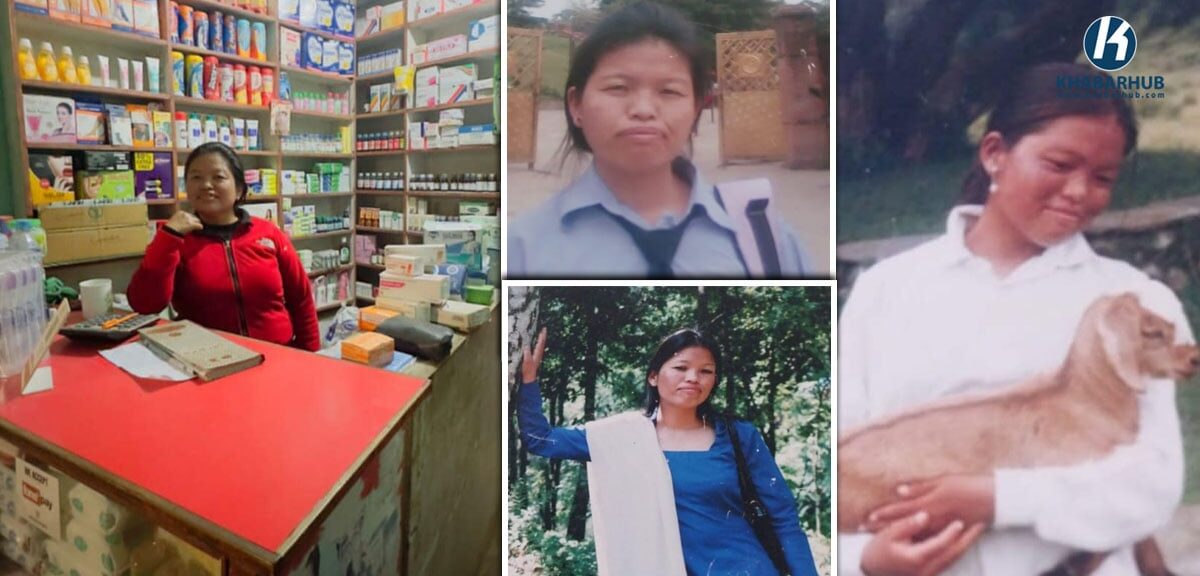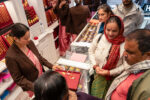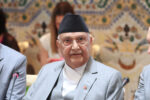KATHMANDU: Prima Gharti Magar runs a small pharmacy near the Ganesh Temple in Milan Chowk, Kapan in Kathmandu.
Women who shop around her pharmacy sit in front, chatting and basking in the sun. Prima spends her days happily serving the customers who visit.
Her daily life may seem ordinary now, but the struggles Prima has endured to get to this point are deeply difficult and inspiring. Here is the story of her journey.
A Heartbreaking Story
I was born in the remote hilly district of Rolpa, the youngest of six siblings. My grandfather contracted leprosy, and at that time, patients were not allowed to live with their families in Rolpa.
The village panchayat decided that those affected by the disease should be taken to the forest. If any family refused to follow this decision, the entire family would be ostracized.
Following the Panchayat’s decision, my grandfather was taken to the forest. As long as he was able to cook and eat on his own, he was given utensils, rations, and water.
In Pokhara, I was told that I was too old to teach and too young to train, so I was assigned to work at the organization’s goat farm. I spent my days grazing the goats, many of which would give birth in the forest.
If he couldn’t, the family would provide him with food. But there was no other contact. My grandfather died in the forest from leprosy.
A few years later, my father was diagnosed with the disease. By then, it was no longer necessary to leave him in the forest, but he was still kept away from the family.
A small hut was built a little ways from the house, and he was confined there. Medicine had become available by then, but he was never given it.
After falling ill, my mother remarried and left, leaving us siblings behind while we were still very young.
Years later, my mother also began to show symptoms. I was 10 at the time, and given that my grandfather and father had leprosy, it was easy for me to recognize the signs.
At 11, I was diagnosed with leprosy myself. With the help of some relatives, I began taking medicine at a health post far from home.
I thought my father would recover once I began treatment, so I started giving him the medicine as well. But by then, it was too late.
The medicine didn’t help him, and he passed away in the hospital, after being admitted in the last stage of the disease.
Despite my ongoing treatment, my family still refused to keep me at home. They wouldn’t even drink water that I had touched, wouldn’t allow children to come near me, and isolated me completely.
They believed that if I recovered, it might bring back the health of my grandparents and father. While undergoing treatment, I had a severe ‘type 2 reaction,’ which required me to stay in the hospital.
I was admitted to Mission Hospital Dang with the help of an organization called INF Nepal.
I was treated there for 18 months, with all my medical, food, and accommodation expenses covered by the organization.
During my 18 months in the hospital, only two of my relatives visited me: one was my blood brother, and the other was my uncle by marriage. No one else from my family came to see me.”
Prima’s Journey of Survival
After 18 months of treatment, I fully recovered. The hospital staff accompanied me home and reassured my family that the disease was completely cured and that there was no risk of infection.
They explained that I could safely stay at home, even providing documentation to ease their concerns.
But when I returned, the atmosphere at home was still unbearable. No one would drink the water I touched, and no one was allowed to come near me.
Despite being cured, I was treated the same way as before. One day, after a minor argument with my grandmother over the same issue, I was kicked out of the house.
With nowhere to go, I turned to my maternal grandmother, sharing everything that had happened.
She helped me with the 200 rupee fare to reach Dang but told me that she could no longer support me.
She advised me to work there and earn my own living, telling me not to return. I was only 14 years old at the time.
The Tragedy of Wandering Hungry
I reached Dang by renting a car with the money my grandmother gave me. The first place I went was Mission Hospital, where I had previously been treated, but I soon realized they only offered free care to admitted patients.
I wandered the streets of Dang, searching for work while going hungry. One day, a woman offered me a job to help with her child and housework.
I agreed, but her child tormented me—ordering me to walk forward and backward, causing me emotional distress. Eventually, I quit that job.
At times, I worked in a brick kiln or a gravel-crushing plant. But whenever I did any physically demanding work, I would get a fever and body aches.
Every night, I would return to the hospital to sleep, where kind people would offer me food.
The hospital staff, who knew me from my treatment, would hide me to keep me safe, telling me to leave before dawn to avoid losing their jobs.
Though I had been cured of leprosy, I still hadn’t received the full course of the necessary medicine, and I continued taking it. I also struggled to find nutritious food.
My days were spent searching for work, while my nights were spent at the hospital, where I could at least find some comfort.
One day, I was desperate and hungry, so I went to a hotel. They recognized me as related to my uncle and offered me food and a place to stay. But the peace didn’t last.
The people in the hotel would argue, and I found myself staying up at night, worrying about their young child. Eventually, I couldn’t tolerate the constant conflict, and I left.
With no place else to turn, I returned to the hospital once more. I expressed a desire to study and asked if there was anyone who could help.
The hospital staff informed me that INF Nepal, the organization that had supported my treatment, offered various training programs. They took me to Pokhara.
But they explained that I shouldn’t always stay in the same place and encouraged me to remain in Kathmandu. I continued to sweep floors for about two years.
In Pokhara, I was told that I was too old to teach and too young to train, so I was assigned to work at the organization’s goat farm. I spent my days grazing the goats, many of which would give birth in the forest.
Carrying the newborn goats to the barn was physically demanding, but I persevered, trying to make a living.
At that time, I wanted to attend church on Saturdays, but I couldn’t go while working on the farm. I didn’t want to continue working there, so I decided to leave.
The people in charge promised me that when I grew up, they would find me a husband, give him a job, and provide me with a place to stay, but I didn’t believe them.
I told them, “Let me do something else.” They said, “I can’t help you with that.” Then they suggested, “Why don’t you go to Kathmandu, where you’ll receive self-employment training and have the opportunity to study?”
When I reached Dang from Rolpa, they told me to go from Dang to Pokhara, and then to Kathmandu. I was exhausted and disheartened by my life. I had already suffered so much at such a young age.
How much more could I endure? What kind of fate had I been born into? I cried and begged them to let me stay where I was. They reassured me and, with the organization’s support, I stayed.
While I was staying there, a person from Kathmandu, representing an organization called “New Saddle,” came and promised to love and teach me new skills.
In the Nepali month of Magh 2055 BS, I started working with that organization. The love and support I received in Kathmandu were even greater than in Pokhara.
The organization had an office in Mahakal Panitanki, where I initially did some light tasks like painting.
Additionally, because I studied at a government school, my English wasn’t strong. It took me four years to complete the pharmacy diploma because of one subject. But now, with my own license, I run a pharmacy and make a living.
A few months later, they told me there was no one to sweep the floors, so I took on that responsibility. Although I was reluctant, I did the work.
At that time, some people from the Pokhara organization came to visit me, and I really wanted to go back to Pokhara.
But they explained that I shouldn’t always stay in the same place and encouraged me to remain in Kathmandu. I continued to sweep floors for about two years.
Later, the organization members suggested that since I was interested in sewing, I should pursue that and start training as a tailor.
After 21 years of learning, I finally found my path.
Although I arrived in Kathmandu in 2055 BS to work and study, I didn’t get the opportunity to enroll in school until 2061 BS, by which time I was already 21 years old.
I didn’t have time for a community school, so I enrolled in Prerna Mahila Secondary School in Satdobato, where classes were held in the mornings. I began my studies there.
However, the institution where I worked didn’t provide any special accommodations for my studies.
The office made it clear that my work would not be reduced to accommodate my education. I made a firm decision not to give up my studies under any circumstances.
Sticking to that resolve, I attended school in the mornings and worked hard all day, sometimes even at night.
My studies progressed well. I was enrolled in 1st grade in 2061 BS. By 2062 BS, I moved directly to 5th grade.
In 2063 BS, I skipped 7th grade and jumped straight to 6th grade. By 2066 BS, I had passed the SLC within just six years of enrolling in school.
The Boost from SLC
Even after enrolling in school, I continued to make good progress. Although I had hoped to achieve a first division, I ended up with a second division, which only fueled my enthusiasm further.
I had been studying since first grade on a scholarship from the Leprosy Control Association, and later received a 45 percent scholarship for my continued studies.
They also offered to build a house for me if I wanted to marry or had a boyfriend. But at that time, I didn’t have a boyfriend. I was more eager to study, so I decided to focus on my education instead of getting married.
The remaining 55 percent of my education was funded through the money I earned from my hard work. Pursuing a diploma in pharmacy wasn’t easy.
First, I studied late into the night, and on top of that, I wasn’t an ideal student because I had skipped a grade.
Additionally, because I studied at a government school, my English wasn’t strong. It took me four years to complete the pharmacy diploma because of one subject. But now, with my own license, I run a pharmacy and make a living.
Even before this, I always wanted to study more, but I felt I was too old. It’s been about 10 years since I stopped studying, and now I feel I can’t go back to school, says Prima.
Finding Happiness Without Marriage
It was difficult to even consider marriage after turning 40. By that time, there was no one who thought about marriage for me, no one to talk to or take responsibility for me.
I did receive marriage proposals from some places, but I didn’t have the courage to accept.
Marriage seemed like such a big decision, and I wondered what would happen tomorrow—whether it would turn out as I expected or not. I just couldn’t make that decision for myself.
Before I joined school, the organization I was working for used to build houses for people affected by leprosy who married at a young age, around 19 or 20, and had families.
While there is some relief when local representatives help, the harmful beliefs—like not touching a patient, not eating food they’ve touched, and continuing to hate them—haven’t changed in over twenty years.
They also offered to build a house for me if I wanted to marry or had a boyfriend. But at that time, I didn’t have a boyfriend. I was more eager to study, so I decided to focus on my education instead of getting married.
Now that I’m older, my routine is stable, and I’ve come to realize that I don’t need to marry to live a fulfilling life.
Many of my friends, who are married and living their lives, have families. But I consider myself independent compared to them.
Regret of Not Being Able to Save My Father
When my grandfather was ill, there was no medicine for leprosy, and no treatment was available. He was left in the forest out of fear of spreading the disease.
During my father’s time, there was medicine, but it wasn’t accessible to him. He passed away at the age of 40.
I experienced the same rejection and isolation that my family and society imposed on me. It wasn’t until I went through it myself that I fully understood the pain of leprosy. But by then, it was too late.
Although I was cured of leprosy in my childhood, I was still kicked out of my home.
Now, no one tells me that I’m a leper or refuses to let me live in their house. I live with respect. Relatives who once hated me now come to visit and stay in my room.
The suffering I endured when I was sick—living in hatred and contempt, needing nutritious food, good care, and family love—was deeply painful.
Despite the awareness campaigns in cities, the situation in rural communities remains the same.
While there is some relief when local representatives help, the harmful beliefs—like not touching a patient, not eating food they’ve touched, and continuing to hate them—haven’t changed in over twenty years.
Various NGOs, INGOs, and organizations are city-centered, and many remote villages like Rolpa are left without help.
I arrived here after enduring many hardships on my own. My hope is that today’s patients don’t have to suffer the same way I did. I urge the government and other stakeholders to pay more attention to this issue.








Comment